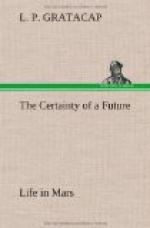“And now our world follows, with its scientific life which probably represents its normal limit. Beyond this it will not go. As we have developed through a brawn and sense period to our present stage, so in Mercury and Venus, ages have prevailed of development which eventuated in their final fixed stages at brawn and sense. In Venus, too, the brawn stage preceded the sense period. In us both have preceded the scientific stage. There has been, may we not think, constant interchanges between these planets of such lives as survive material dissolution, and they have found the nidus that fits them in each. Souls leaving us in a brawn epoch have fled to Mercury, souls leaving us in a sense epoch have fled to Venus, and all souls in Mercury or Venus, ready for reincarnation in a scientific epoch, have come to us.
“But there is an important postulate underlying this theory. It is, that upon each planet the possibilities of development just attain to the margin of the next higher step in mental evolution. That is, that on Mercury the period of brawn develops to the possibility of the period of sense without fully exemplifying it, so in Venus the period of sense develops to the possibility of the period of science without attaining it, and in our world the period of science develops to the period of spirit, without, in any universal way, exhibiting it.
“These are steps progressively represented, I may imagine, in the planets. And, in the further progress outward, we reach the planet Mars. Let us place here the period of spirit. On Mars is accomplished in society, and accompanied by an accomplishment in its physical features, also, of those ideals of living which the great and good unceasingly labor to secure for us here and unceasingly fail to secure. O my child, if we could learn somehow to get tidings from that distant sphere, if only the viewless abyss of space between our world and Mars might be bridged by the noiseless and unseen waves of a magnetic current.”
We reached Christ Church in June, in 1883, and for one year were most busy in completing the station we had selected, in receiving apparatus, getting our observatory built and a useful, but not large telescope mounted.
The position taken by us was attractive. It was upon a high hill, a glacial mound which had been smoothed upon its upper surface into a long and broad plain. The prospects from this position were exceedingly beautiful. Christ Church was some ten miles distant and the irregular shores northward outlined by ribbons of breaking waves lay upon the seaward margin of our vision, while the broken intermediate landscape, with interrupted agricultural domains and forests was in front of us and far above us rose the grander peaks of the New Zealand Alps, a constant charm through the changing atmosphere, now brought near to us through the optical refraction of the clear air, and again




